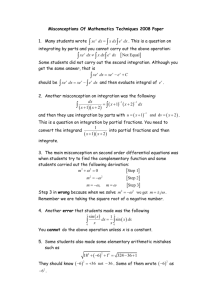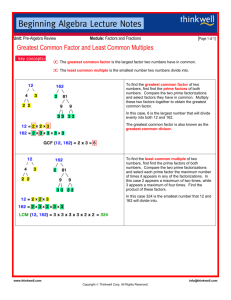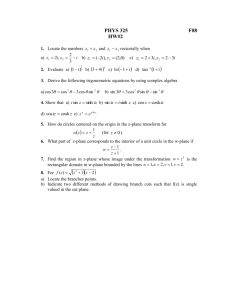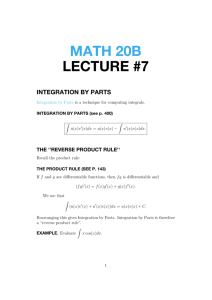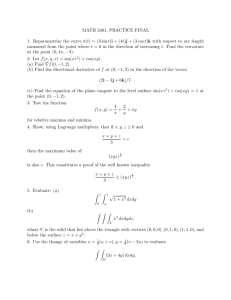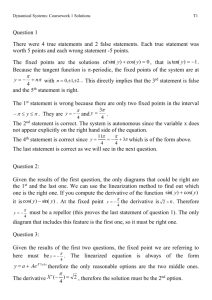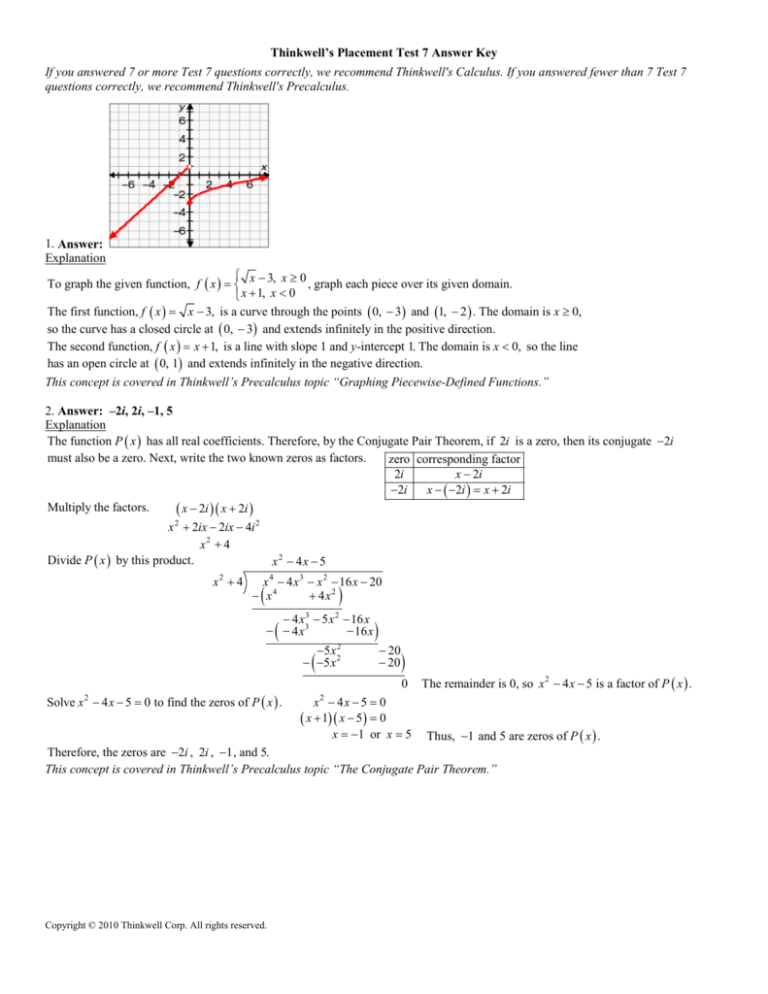
Thinkwell’s Placement Test 7 Answer Key
If you answered 7 or more Test 7 questions correctly, we recommend Thinkwell's Calculus. If you answered fewer than 7 Test 7
questions correctly, we recommend Thinkwell's Precalculus.
1. Answer:
Explanation
To graph the given function, f x x 3, x 0 , graph each piece over its given domain.
x 1, x 0
The first function, f x x 3, is a curve through the points 0, 3 and 1, 2 . The domain is x 0,
so the curve has a closed circle at 0, 3 and extends infinitely in the positive direction.
The second function, f x x 1, is a line with slope 1 and y -intercept 1. The domain is x 0, so the line
has an open circle at 0, 1 and extends infinitely in the negative direction.
This concept is covered in Thinkwell’s Precalculus topic “Graphing Piecewise-Defined Functions.”
2. Answer: –2i, 2i, –1, 5
Explanation
The function P x has all real coefficients. Therefore, by the Conjugate Pair Theorem, if 2i is a zero, then its conjugate 2i
must also be a zero. Next, write the two known zeros as factors.
zero corresponding factor
x 2i
2i
2i
x 2i x 2i
Multiply the factors.
x 2i x 2i
x 2 2ix 2ix 4i 2
x2 4
Divide P x by this product.
x2 4 x 5
x2 4
x 4 4 x 3 x 2 16 x 20
x4
4 x2
4 x 3 5 x 2 16 x
4 x3
16 x
5 x 2
5 x 2
20
20
0
Solve x 2 4 x 5 0 to find the zeros of P x .
x2 4 x 5 0
x 1 x 5 0
x 1 or x 5
The remainder is 0, so x 2 4 x 5 is a factor of P x .
Thus, 1 and 5 are zeros of P x .
Therefore, the zeros are 2i , 2i , 1, and 5.
This concept is covered in Thinkwell’s Precalculus topic “The Conjugate Pair Theorem.”
Copyright © 2010 Thinkwell Corp. All rights reserved.
3. Answer:
19
4
3
17
4 22
x2
x
x
Explanation
Express as a partial fraction with
A, B, and C as the numerators.
9 x2 7 x 3
3
x 2x
Create a common denominator and simplify
the numerator. Then, factor out x 2 and x.
2
9 x2 7 x 3
x
2
x 2
A
B C
2
x2 x x
A x 2 B x 2 x C x 2
A
B C
2
x2 x x
x 2 x2
2
2
Ax Bx 2 Bx Cx 2C
x 2 x2
A B x 2 2 B C x 2C
x 2 x2
Equate the coefficients to write
a system of equations.
9 x2 7 x 3
x3 2 x 2
A B x 2 2 B C x 2C A B 9
2 B C 7
x 2 x2
2C 3
Solve for B.
Solve for A.
A B 9
2B C 7
17
3
A 9
2B 7
Substitute to find the partial decomposition.
4
2
19
17
3
19
9 x2 7 x 3
A
B C
17
4
4
2
A
B
3
2
2
4
x2 x x
x 2 x x2
x 2x
4
This concept is covered in Thinkwell’s Precalculus topic “Partial Fractions: Another Example.”
Solve for C.
2C 3
3
C
2
4. Answer: 15/4
Explanation
1
2
, , and : sin , cos
, and tan 3.
6 4
3
6 2
4
2
3
sin 2 cos 2 tan 2
6
4
3
Recall the values of the trigonometric functions for the angles
Use these values to simplify the expression.
2
2
2
1 2
3
2 2
1 2
3
4 4
15
4
This concept is covered in Thinkwell’s Precalculus topic “Trigonometric Functions of Important Angles.”
5. Answer:
Explanation
Begin by graphing the function y 2sin x, which has a period of 2 and an amplitude of 2.
Then, to graph y 2sin x 1 2, shift the graph of y 2sin x right 1 unit and up 2 units.
This concept is covered in Thinkwell’s Precalculus topic “Graphing Sine and Cosine Functions with Phase Shifts.”
Copyright © 2010 Thinkwell Corp. All rights reserved.
6. Answer: 4 sec2
Explanation
Subtract the fractions by using a common
denominator and then use the Pythagorean
Identity, sin 2 cos 2 1, to simplify.
2
2
sin 1 sin 1
2 sin 1 2 sin 1 Write the fractions with a
common denominator and subtract.
sin 1 sin 1
2sin 2 2sin 2
2
sin 1
2sin 2 2sin 2
sin 1
4
Combine like terms in the numerator.
sin 2 1
4
sin 2 sin 2 cos 2
4
cos
2
Distribute the negative in the numerator.
2
Distribute in the numerator twice
and FOIL in the denominator.
1
1
Use the Pythagorean Identity.
Combine like terms in the denominator.
2
Simplify using 1/cos = sec .
4sec
This concept is covered in Thinkwell’s Precalculus topic “Simplifying Products of Binomials Involving Trigonometric Functions.”
7. Answer: 0,
5
6
,
6
, and
Explanation
Manipulate the equation so that it is equal to 0 and then factor.
sin 2
1
sin
2
1
sin 2 sin 0
2
1
sin sin 0
2
Now set each factor equal to zero and solve each equation.
sin 0
Sine has a value of zero when is equal to 0 n. So within the specified interval there are two
solutions, x 0 and x .
1
sin 0
2
1
sin
2
When sine takes a value of one-half, then the opposite side is equal to 1 and the hypotenuse is equal to 2.
These numbers generate the famous 1: 3:2 triangle, also known as the 30 : 60 : 90 triangle.
5
and
6
6
5
So, the solutions within the interval 0, 2 are 0, ,
, and .
6 6
This concept is covered in Thinkwell’s Precalculus topic “Solving Trigonometric Equations by Factoring.”
Copyright © 2010 Thinkwell Corp. All rights reserved.
8. Answer: 1/25
Explanation
Substitute 2 for E t in the given function, E t 2 cos 50 t , and solve for t.
2 2 cos 50 t
1 cos 50 t
cos 1 1 50 t
2 n 50 t
1
t
n, where n is any integer
25
1
.
25
This concept is covered in Thinkwell’s Precalculus topic “Solving Word Problems Involving Trigonometric Equations.”
The smallest possible value of t will occur when n 1 and that value of t is
9. Answer:
2 4
,
,0
3
3
Explanation
To solve the equation cos 2t cos t for t when t is in the interval 0, 2 , use the double-angle formula for cos 2t.
cos 2t cos t
2 cos 2 t 1 cos t Double - Angle Formula
2cos 2 t cos t 1 0
Subtract cos t from each side.
Factor.
2 cos t 1 cos t 1 0
Set each factor equal to 0 and solve each equation for t.
2 cos t 1 0
cos t 1 0
1
cos t
cos t 1
2
2 4
,
t
t0
3 3
This concept is covered in Thinkwell’s Precalculus topic “Using Double-Angle Identities.”
10. Answer: 13
Explanation
Since a 7.25 inches, and side b is 1.3 inches longer than side a , it follows that b 7.25 1.3 8.55 inches. It is given that 38.
In relation to this known angle, , the length of the adjacent side, a, is less than the length of the opposite side, b. So, exactly one
triangle can be formed where a 7.25 inches, b 8.55 inches, and 38, since a b.
Use the Law of Sines to find .
sin sin
b
a
sin 38 sin
7.25
8.55
7.25 sin 38
sin
8.55
sin 0.522...
31.5
Use the Law of Sines again to find c.
Now use the measures of and , along with the fact
sin sin
that the sum of the angles of a triangle is 180, to find .
180
c
b
31.5 38 180
sin110.5 sin 38
8.55
c
69.5 180
.55 sin110.5
8
110.5
c
sin 38
c 13
This concept is covered in Thinkwell’s Precalculus topic “Solving a Triangle (SAS): Another Example.”
Copyright © 2010 Thinkwell Corp. All rights reserved.
Guidelines for Interpreting Placement Test Scores
Placement Test
Number of
Correct Answers
Placement Test 1
5 or more
Thinkwell’s 6th Grade Math
6 or less
Thinkwell’s 6th Grade Math
7 or more
Thinkwell’s 7th Grade Math
4 or less
complete Placement Test 2
5 or 6
Thinkwell’s 7th Grade Math
7 or more
Thinkwell’s 8th Grade Math
4 or less
complete Placement Test 3
5 or 6
Thinkwell’s 8th Grade Math
Placement Test 2
Placement Test 3
Placement Test 4
Placement Test 5
Placement Test 6
Placement Test 7
7 or more
Thinkwell’s Intermediate Algebra (Algebra 1)
4 or less
complete Placement Test 4
5 or 6
Thinkwell’s Intermediate Algebra (Algebra 1)
7 or more
Thinkwell’s College Algebra (Algebra 2)
4 or less
complete Placement Test 5
5 or 6
Thinkwell’s College Algebra (Algebra 2)
7 or more
Thinkwell’s Precalculus
4 or less
complete Placement Test 6
5 or 6
7 or more
Copyright © 2010 Thinkwell Corp. All rights reserved.
Recommendation
Thinkwell’s Precalculus
Thinkwell’s Calculus


